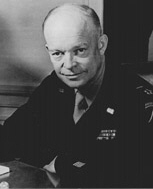| United States
History
Still, he shared with Truman a basic view of American foreign policy. Eisenhower, too, perceived communism as a monolithic force struggling for world supremacy. He believed that Moscow, under leaders such as Stalin, was trying to orchestrate worldwide revolution. In his first inaugural address, he declared, "Forces of good and evil are massed and armed and opposed as rarely before in history. Freedom is pitted against slavery, lightness against dark." In office, Eisenhower and his secretary of state, John Foster Dulles, argued that containment did not go far enough to stop Soviet expansion. Rather, a more aggressive policy of liberation was necessary, to free those subjugated by communism. But for all of the rhetoric, when democratic rebellions broke out in areas under Soviet domination -- such as in Hungary in 1956 -- the United States stood back as Soviet forces suppressed them. Eisenhower's basic commitment to contain communism remained, and to that end he increased American reliance on a nuclear shield. The Manhattan Project during World War II had created the first atomic bombs. In 1950 Truman had authorized the development of a new and more powerful hydrogen weapon. Now Eisenhower, in an effort to keep budget expenditures under control, proposed a policy of "massive retaliation." The United States, under this doctrine, was prepared to use atomic weapons if the nation or its vital interests were attacked. In practice, however, Eisenhower deployed U.S. military forces with great caution, resisting all suggestions to consider the use of nuclear weapons in Indochina, where the French were ousted by Vietnamese communist forces in 1954, or in Taiwan, where the United States pledged to defend the Nationalist Chinese regime against attack by the People's Republic of China. In the Middle East, Eisenhower resisted the use of force when British and French forces occupied the Suez Canal and Israel invaded the Sinai in 1956, following Egypt's nationalization of the canal. Under heavy U.S. pressure, British, French and Israeli forces withdrew from Egypt, which retained control of the canal. 
Custom Search
Source: U.S. Department of State |
 Dwight D. Eisenhower, who assumed the presidency in 1953, was
different from his predecessor. A war hero, he had a natural, homey
manner that made him widely popular. "I like Ike" was the
ubiquitous campaign slogan of the time. In the postwar years, he served
as army chief of staff, the president of Columbia University and finally
head of NATO before seeking the Republican presidential nomination.
Although he was skillful at getting people to work together, he sought
to play a restrained public role.
Dwight D. Eisenhower, who assumed the presidency in 1953, was
different from his predecessor. A war hero, he had a natural, homey
manner that made him widely popular. "I like Ike" was the
ubiquitous campaign slogan of the time. In the postwar years, he served
as army chief of staff, the president of Columbia University and finally
head of NATO before seeking the Republican presidential nomination.
Although he was skillful at getting people to work together, he sought
to play a restrained public role.